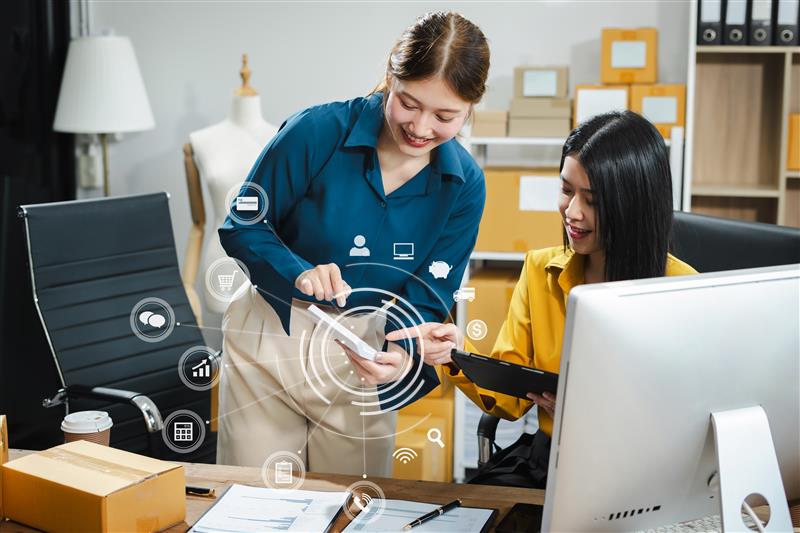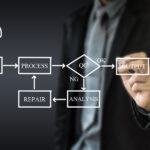Blog Insights
How ERPNext Helps Fast-Moving Consumer Goods Businesses

How ERPNext Helps Fast-Moving Consumer Goods Businesses
Fast-Moving Consumer Goods (FMCG) companies work in a very competitive sector because, in this industry, products move fast and margins stay tight. Customers demand speed, quality, and consistency. To keep up, businesses need systems that manage everything in real time. ERPNext gives FMCG companies the tools to do exactly that.
This guide explains how ERPNext supports FMCG operations, from supply chain and inventory to sales, distribution, and compliance.
What Makes FMCG Businesses Unique
Fast-Moving Consumer Goods, or FMCG, are the essential products you use daily. They could be food, drinks, cleaning supplies, toiletries, and personal care items – anything you buy, use, and replace daily, monthly, or in a short time.
FMCG businesses face these challenges more often:
- High volume transactions every day.
- Slim profit margins that require strict cost control.
- Short product life cycles because of expiry dates and consumer demand shifts.
- Complex distribution networks that serve multiple regions.
- Strict compliance with safety and labeling standards.
Without the right ERPNext, FMCG companies can lose track of stock, fail to deliver properly on time, and waste resources that they didn’t have to.
Why FMCG Companies Need ERPNext Software
ERPNext is an open-source Enterprise Resource Planning (ERP) platform that helps businesses manage every aspect of operations under one roof. For FMCG companies, ERPNext does more than just replace spreadsheets. It creates a single source of data across sales, inventory, manufacturing, procurement, and finance.
Here’s why FMCG firms prefer ERPNext:
- It works in real time.
- It adapts to changing demand.
- It reduces operational costs.
- It ensures compliance with industry standards.
ERPNext Makes Supply Chain Management Easy
A strong supply chain keeps FMCG products on shelves. ERPNext makes supply chain tasks easy so that businesses don’t lose money or customers.
Features of ERPNext that help FMCG companies are:
- Purchase management: Automates supplier orders and approvals.
- Vendor tracking: Keeps records of supplier performance.
- Material requests: Make sure procurement teams order only what is needed.
- Pricing rules: Maintain the right prices in supplier contracts.
With ERPNext customized for FMCG, businesses can avoid raw material shortages and control purchasing costs.
ERPNext Makes Inventory Easy to Handle
Inventory control can make FMCG businesses fail or successful. Overstocking FMCG products creates waste. Understocking FMCG items leads to lost sales. But ERPNext can help you handle inventory.
Inventory benefits in ERPNext for FMCG:
- Keep tabs on stock levels across all your warehouses.
- Stay on top of batch numbers and expiry dates.
- Get a real-time snapshot of available products.
- Set up automatic reordering when stock is running low.
- Easily manage multiple warehouses and regions.
For FMCG, expiry tracking for items is critical. ERPNext flags items when they reach near their expiration dates. This tracking of expiration date helps businesses prioritize sales and reduce losses.
ERPNext Helps Plan Manufacturing and Production
Many FMCG companies make products before they send them out for distribution. That stage can get complicated if you don’t have the right system in place. ERPNext gives managers clear tools to plan, schedule, and monitor production.
Some ERPNext features for manufacturing include:
– Get a clear list of materials you need for each product.
– Track work orders so that you can stay on schedule and avoid mix-ups.
– Identify potential production bottlenecks before they happen.
– Catch quality issues early with built-in checkpoints.
– Waste monitoring that helps teams cut down on extra costs.
Instead of creating and managing spreadsheets or separate systems, ERPNext puts all these tasks in one place. That way, FMCG companies can produce the right amount at the right time and keep shelves stocked.
ERPNext Makes Sales and Distribution Management Smooth
Getting products from the factory to shelves requires seamless coordination. ERPNext connects sales teams with distribution channels.
Sales and distribution features of ERPNext:
- Customer Relationship Management (CRM) for tracking leads and accounts.
- Speed up sales orders to avoid delays.
- Plan the best delivery routes.
- Set custom prices and discounts.
- Track shipments live.
ERPNext Helps Handle Financial Control and Cost Management
FMCG businesses survive on tight margins, and ERPNext helps track every dirham that flows in and out.
ERPNext Finance features include:
- Automated invoicing.
- Connect sales and purchases in one place.
- Keep tabs on expenses.
- Handle multiple currencies for international business.
Managers see financial performance in real time, which allows better cost control and profitability.
ERPNext Also Helps with Compliance and Quality Control
Regulations in the FMCG sector can be strict. From food safety laws to labeling rules, non-compliance in the FMCG industry can lead to penalties and fines. ERPNext for FMCG businesses assists in keeping companies compliant.
How ERPNext helps compliance:
- Tracks every batch from raw material to final product.
- Records quality checks and inspections.
- Generates traceability reports for audits.
- Ensures labeling and packaging meet standards.
Data and Analytics for FMCG Growth
FMCG companies move fast, and every decision counts. ERPNext gives managers clear reports and dashboards that show how the business is doing in real time. Leaders can see the numbers and act with confidence.
ERPNext analytics can show:
ERPNext analytics can show:
- Find out which areas sell the most.
- See how products are added and removed from stock.
- Know which suppliers deliver on time and meet quality standards.
- Know where costs are reducing profits.
- Find how customers buy and what they like.
Business owners can now make smart decisions based on clear facts.
Customization and Integration
Every FMCG company works in its own way. ERPNext adapts to those needs without forcing teams to change their style of working.
Some ways That ERPNext can adjust include:
- Adding custom fields for unique product or process details.
- Linking directly with e-commerce platforms for smooth online sales.
- Using APIs to connect with other business tools.
- Offering mobile access so field staff can work from anywhere.
Benefits of ERPNext for FMCG Businesses
ERPNext offers many different advantages, but companies also need to know the challenges.
Pros
- All business functions managed in one system.
- More affordable than many big ERP solutions.
- Real-time visibility across sales, inventory, and finance.
- Simple expiry tracking and compliance support.
- Easy to scale as the business grows.
Challenges
- Staff need training to use the system well.
- Implementation time depends on company size and processes.
- Remote warehouses must have reliable internet for smooth use.
A Real-World Example: Packaged Snack Distributor
Suppose a regional snack distributor has three warehouses that are spread across different states. On any day, stock moves in and out at a speed that can overwhelm traditional tracking methods. When certain items run low, the system raises new purchase orders automatically, which keeps supply steady.
The delivery side changes too. Instead of drivers working from outdated route sheets, ERPNext suggests efficient paths that save fuel and time. At the same time, payments from retailers post directly into the system, removing the errors that creep in when numbers are copied across spreadsheets.
For a distributor trying to grow without ballooning costs, this kind of control makes a difference. It means fewer stockouts, tighter spending, and stronger relationships with retailers.
Even payment records from hundreds of retailers flow into the same platform without errors.
For a growing distributor, the results are simple: lower costs, fewer stockouts, and happier customers. Startups and mid-size FMCG firms often choose ERPNext because it strikes the right balance between affordability and functionality.
Bottom Line
FMCG businesses need systems that require speed, control, and data for insight. ERPNext for FMCG businesses can create the best foundation for managing all kinds of operations in one place.
By adopting ERPNext, FMCG companies can reduce waste, cut costs, and deliver better products to market on time. In a fast-moving industry, that makes the difference you need.







